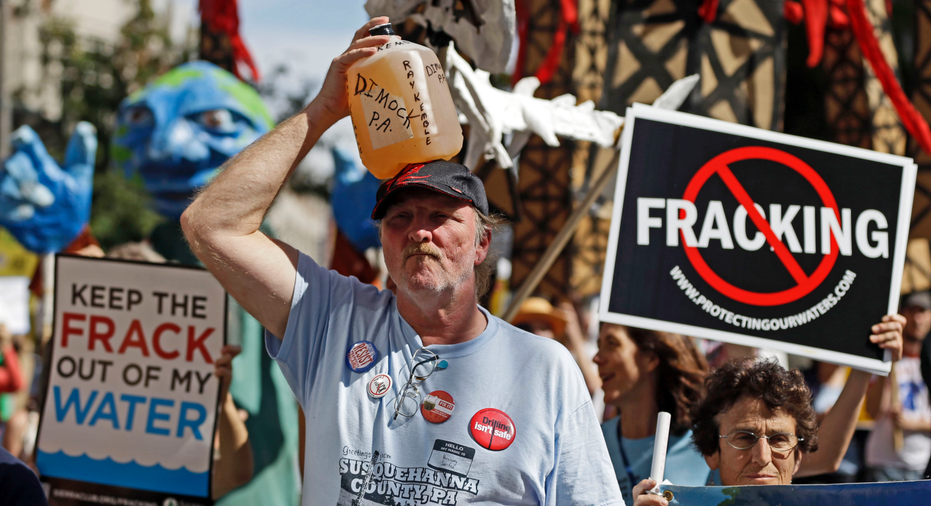APNewsBreak: Feds back in 'Gasland' town to test water, air

The federal government has returned to a Pennsylvania village that became a flashpoint in the national debate over fracking to investigate ongoing complaints about the quality of the drinking water.
Government scientists are collecting water and air samples this week from about 25 homes in Dimock, a tiny crossroads about 150 miles north of Philadelphia.
"Take a skunk and every household chemical, put it in a blender, puree it for five minutes and take a whiff," said Dimock resident Ray Kemble, 61, describing the smell of his well water. "It burns the back of your throat, makes you gag, makes you want to puke."
He said investigators from the Agency for Toxic Substances and Disease Registry, a federal public health agency, were at his house Monday to collect samples.
Fracking is a method that uses huge amounts of pressurized water, along with sand and chemicals, to extract oil and natural gas from rock formations deep underground.
Dimock was the scene of the most highly publicized case of methane contamination to emerge from the early days of Pennsylvania's natural gas-drilling boom. State regulators blamed faulty gas wells drilled by Cabot Oil & Gas Corp. for leaking combustible methane into Dimock's groundwater.
Cabot, one of the largest natural gas producers in the state, has consistently denied responsibility, saying methane was an issue in the groundwater long before it began drilling.
"Numerous sets of data collected over the past several years in Dimock, by both EPA and DEP, have confirmed there is no threat to human health and the environment," said company spokesman George Stark, referring to federal and state environmental agencies.
The Agency for Toxic Substances and Disease Registry said Thursday it is testing the water for bacteria, gases and chemicals. The agency is also testing indoor air for radon. Sampling results are expected in the fall, which will be shared with residents. A report will be released to the public next year.
"Residents have continued to raise concerns about natural gas activities impacting their private water well quality," the agency said in a statement to The Associated Press. It said the investigation will "determine if there are drinking water quality issues that may continue to pose a health threat."
It's the first time ATSDR itself has tested private well water in Dimock. The Environmental Protection Agency conducted testing in 2012. ATSDR analyzed those samples and found explosive levels of methane in some wells, along with hazardous chemicals "at levels high enough to affect health." It did not link the problems to drilling, citing a lack of pre-drilling test data.
For a time, Dimock was ground zero in environmental activists' fight against fracking, the technique that has given energy companies the ability to reach enormous, previously inaccessible deposits of oil and natural gas. The village was featured in the Emmy Award-winning 2010 documentary "Gasland," which showed residents lighting their tap water on fire. Drilling supporters have long accused Dimock residents of seeking money and attention.
Kemble, who became a high-profile anti-drilling activist after his water well was contaminated, said his water got worse after Cabot fracked three wells near his house. He said he continues to fill a large plastic tank on his property with clean water he hauls from a neighboring community.
"It's all still bad. That's why they're back up here," said Kemble, who was among dozens of plaintiffs who settled a lawsuit against Cabot in 2012.
In April, a federal judge threw out a $4.24 million jury verdict against the Houston-based driller and ordered a new trial in a lawsuit alleging that Cabot contaminated the well water of two families who were not part of the 2012 settlement.



















